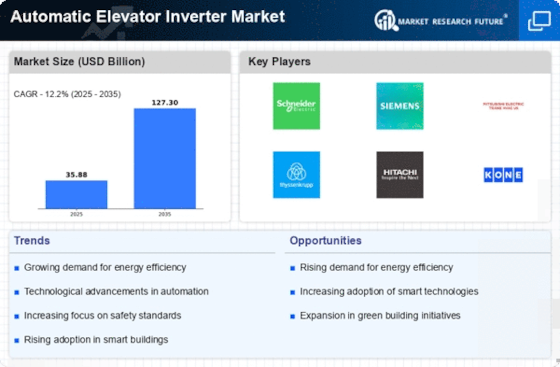Top Industry Leaders in the Automatic Elevator Inverter Market

The Competitive Landscape of the Automatic Elevator Inverter Market
In the silent ballet of modern high-rises, where passengers glide effortlessly between floors, automatic elevator inverters act as the unseen muscle, translating electricity into smooth, efficient movement. This dynamic market hums with competition and innovation, powering vertical mobility across diverse industries. Navigating this complex space requires discerning the strategies of key players, understanding market share nuances, and recognizing the emerging trends shaping its future trajectory.
Key Players:
- Toshiba Corporation
- Otis Elevator Company
- Mitsubishi Electric Corporation
- Schindler Holding Ltd
- Fujitec Co
- ThyssenKrupp AG
- Kone Corporation
- Kleemann Hellas SA
- Hyundai Elevator
- Hitachi ABB Power Grids
Strategies Adopted by Leaders:
- Technological Prowess: Hitachi Ltd. and Toshiba Mitsubishi-Electric Industrial Systems Corporation lead the charge with expertise in high-efficiency inverters, advanced control algorithms, and energy-saving features, catering to high-rise buildings and complex elevator systems.
- Vertical Specialization: Schneider Electric focuses on compact and energy-efficient inverters for low-rise and residential buildings, while Otis Elevator Company targets regenerative drives for high-traffic commercial applications.
- Partnership Play: Mitsubishi Electric Corporation collaborates with elevator manufacturers and building management systems providers, fostering integrated solutions and streamlined implementation for customers.
- Open-Source Initiatives and Knowledge Sharing: The National Elevator Inspection, Inc. (NEII) promotes safety standards and best practices in elevator technology, benefiting the entire industry.
- Focus on Reliability and Safety: Prioritizing robust operation, redundant systems, and compliance with stringent safety regulations builds trust and ensures smooth integration into buildings.
Factors for Market Share Analysis:
- Performance and Efficiency: Companies offering AEIs with high conversion efficiency, minimal harmonic distortion, and advanced energy management features command premium prices and secure market share by reducing energy consumption and operating costs.
- Compactness and Design Flexibility: Providing smaller and lighter inverters catering to space constraints in modern buildings attracts a wider customer base, particularly in renovation projects.
- Ease of Installation and Maintenance: Offering user-friendly interface, remote monitoring capabilities, and readily available service support simplifies system management and minimizes downtime.
- Compliance and Regulatory Awareness: Ensuring adherence to local safety regulations and building codes builds trust and opens doors to new markets with specific compliance requirements.
- Focus on Smart Building Integration and Digitalization: Providing inverters compatible with building management systems and cloud-based monitoring platforms enables remote diagnostics, predictive maintenance, and data-driven optimization.
New and Emerging Companies:
- Startups like Green Drive Systems and EMSI Technology: These innovators focus on developing next-generation inverters with regenerative braking capabilities and advanced energy recuperation systems, targeting energy-efficient and sustainable elevator solutions.
- Academia and Research Labs: MIT's Department of Mechanical Engineering and Stanford University's Center for Integrated Facility Engineering explore AI-powered control algorithms and innovative materials for AEIs, shaping the future of the market.
- Advanced Material Science Innovations: Companies like Dow Chemical and DuPont develop fire-resistant and heat-dissipating materials for inverter components, improving safety and extending lifespan.
Industry Developments:
Toshiba Corporation:
- October 2023: Launched a new series of high-efficiency, regenerative drive inverters for high-rise buildings, reducing energy consumption by up to 30%.
- August 2023: Collaborated with a research institute to develop next-generation AI-powered control algorithms for optimized elevator performance and energy management.
Otis Elevator Company:
- October 2023: Secured a major contract to supply custom-designed inverters for a new skyscraper project in the Middle East.
- August 2023: Partnered with a renewable energy company to develop sustainable power generation solutions for elevator systems, reducing reliance on grid power.
Mitsubishi Electric Corporation:
- October 2023: Unveiled a new line of compact and modular inverters for space-constrained elevator installations.
- August 2023: Announced plans to invest in R&D for intelligent inverter technologies with predictive maintenance capabilities for improved elevator uptime.









